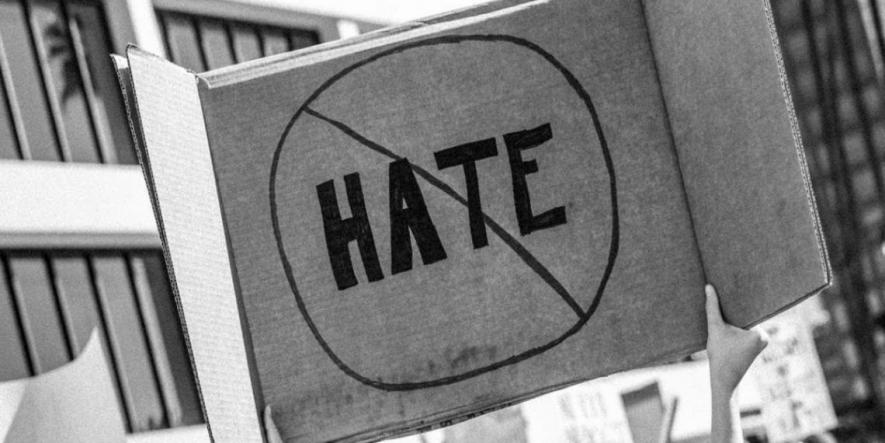Rising Hate: Who Pays the Price?

Image credit: The Leaflet
In recent weeks, the world has been reminded of how rapidly hate and prejudice are spreading across borders. The UN Secretary-General has warned of a “disturbing rise in anti-Muslim bigotry worldwide,” highlighting how violence, discriminatory policies, and exclusion are normalised against entire communities. A European Union survey revealed that physical assault against gender-diverse people have risen from 22% in 2019 to 34%, while hate-motivated harassment has jumped from 42% to 74%. Reports also show a steep rise in racism and apartheid along with anti-immigrant sentiment.
India is no exception. Hate speech, discriminatory laws, and orchestrated campaigns of exclusion have become embedded in the political landscape. Everyday practices from denial of housing to job discrimination and vigilante violence remind minorities that they are treated as second-class citizens. Women, Dalits, Adivasis, and migrant workers remain structurally disadvantaged in labour markets. In such a climate, hate is not just a moral or cultural crisis it is an economic one.
This article asserts that discrimination is not only unjust; it is also economically self-defeating. It undermines the very foundations of growth and prosperity. The remaining article discusses how.
Discrimination and Suppression of Purchasing Power
At the heart of every economy lies the distribution of national product. In principle, wages should reflect the value of labour but discrimination ensures that certain groups defined by caste, gender, religion, or ethnicity are systematically underpaid. India’s Periodic Labour Force Survey (PLFS) makes this clear. On average, women earn less than men in regular salaried jobs. Dalits and Adivasis earn less than upper-caste workers, even when qualifications are similar. Muslims report disproportionately high rates of informal employment and wage insecurity.
Employers benefit in the short run from these suppressed wages. But what is withheld from workers is also withdrawn from the economy. Workers are not just producers; they are consumers. When their incomes shrink, so does their ability to buy goods and services. The cycle of wage discrimination thus translates directly into weakened demand.
Inequality and Intergenerational Traps
The economic effects of discrimination go beyond wages. By ensuring unequal pay and insecure work, discrimination shifts wealth and opportunities into the hands of privileged groups. The resources denied to marginalised workers accumulate as property, land, savings, and capital for the capitalist classes.
This concentration of wealth is not temporary, it gets passed across generations. Children of elites inherit not just money but networks, security, and access to better education and health. By contrast, children of discriminated groups grow up with fewer opportunities, weaker safety nets, and limited chances of mobility.
The result is a trap of inter-generational inequality. Poverty is reproduced, not escaped. Privilege is maintained, not earned. As French economist Thomas Piketty reminds us, when the return on capital exceeds the growth of the economy, inherited wealth grows faster than incomes from labour. Discrimination ensures that this inequality is sharpened further, locking societies into structures of exclusion.
Demand, Investment, and Inevitable Slowdown
Neo liberals often wrongly claim that low wages increase competitiveness. In the short run, profits rise, and firms may continue to invest. Workers adjust to low wages by cutting savings or borrowing. Governments sometimes step in with credit expansion or subsidies, stretching the illusion of stability. However, this illusion cannot last. Demand suppressed for long always returns as economic slowdown. Without adequate purchasing power in the hands of the working class the markets contract. Businesses struggle to sell what they produce. Investment dries up.
Read Also: Justice Bulldozed! A Weapon of Exclusion of Poor
This is why Polish economist Michal Kalecki warned that capitalism has a built-in tendency to restrict workers’ bargaining power. Employers may prefer high unemployment and weak unions because they keep wages down. But the system then suffers from demand shortfalls. In other words, hate and discrimination, by suppressing wages and dividing workers, are not only morally corrosive but also economically irrational.
Double Drain
When domestic demand weakens, capital does not sit idle. It flees abroad, seeking profitable opportunities where consumption is stable. The outflow of wealth from developing economies to richer markets is not only a matter of investment choice, it also reflects the structural inequality of the global economy.
India provides a clear example. As domestic demand falters, outward foreign direct investment (FDI) has risen. Indian elites are increasingly sending their children to universities in the US and the UK, seeking healthcare abroad, and buying luxury properties in Dubai or London. The wealth generated within India flows outward, fuelling prosperity elsewhere.
This is a double drain: capital flight on one side, elite consumption shifted abroad on the other. The home economy loses both the investment potential and the spending power that could have strengthened domestic growth.
False Promise of Competitiveness
Orthodox economists continue to claim that low wages reduce production costs, boosting exports. At best, this delivers a short-term boost. At worst, it locks economies into precarity. An export-led model built on suppressed wages is inherently unstable. Without strong domestic demand, economies become hostage to volatile global markets. As soon as external demand dips, crisis follows. Far from achieving global competitiveness, countries end up with fragile economies dependent on fickle capital flows and external shocks.
This is precisely the trap into which neoliberal reforms pushed the Global South: cutting labour protections, suppressing wages, and celebrating “competitiveness” at the expense of stability.
Global South’s Particular Burden
In developing economies, the economic costs of discrimination are magnified. Weak social protection systems mean that underpaid workers have nothing to fall back on. Informal labour markets spread wage suppression unchecked across entire sectors. Heavy dependence on capital flows accelerates the outflow of resources. In India, 80% of the workforce is informal, according to International Labour Organisation estimates. Wage gaps by gender, caste, and religion mean that even within the formal sector, millions remain excluded from decent work.
When discrimination intersects with informality, the result is a collapse of domestic demand and a cycle of poverty that resists policy interventions. For the Global South, therefore, discrimination is not just an ethical or cultural problem, it is a structural barrier to development. It prevents economies from achieving inclusive growth, locks millions into poverty, and ensures that wealth continues to flow to the North.
Role of the State: Enabler or Corrector?
Discrimination does not persist by accident. States often enable it. Biased laws, communal rhetoric, unequal access to education and healthcare, and the failure to regulate labour markets contribute to structural exclusion. Hate politics divides workers along communal or caste lines, weakening their ability to organise.
The current Indian government provides a stark case. From discriminatory citizenship laws to housing segregation and employment bias, state actions have normalised exclusion. Simultaneously, labour codes have eroded workers’ rights, making it easier for employers to exploit wage gaps. The politics of hate and the economics of cheap labour go hand in hand.
Yet the state also holds the tools to reverse this cycle. Inclusive wage legislation, redistributive taxation, universal social protection, industrial strategies, and capital controls are proven instruments. International cooperation to prevent capital flight and tax avoidance can limit the bleeding of resources. But such policies require political will, a will that is unlikely to emerge from regimes that thrive on hate.
Hate as Political Economy
It is crucial to recognise that hate today is not merely a cultural or ideological phenomenon. It is part of the political economy of neoliberal authoritarianism. By dividing workers along caste, religion, or gender, ruling elites deflect attention from economic failures. Hate becomes a tool of governance, keeping labour cheap, dissent weak, and inequality entrenched. But this strategy is self-defeating. By suppressing wages, draining demand, and fuelling capital flight, discrimination undermines the very foundations of growth. What begins as a short-term advantage for employers and elites ends up as a long-term trap for society.
The Cost of Hate
Hate is not only an ethical failure. It is a lived reality that seeps into the smallest details of daily life. It decides who gets a home to rent, who is hired or excluded from a job, whose children can stay in school, and who is forced to live in fear. It robs people of dignity long before it robs them of wages. But hate also shapes the economy. It divides workers, weakens bargaining power, and allows wages to be suppressed. It drains resources away from where they are most needed and hollows out the foundations of growth. India offers a stark reminder to the world: when hate becomes a tool of governance, prosperity is sacrificed at the altar of exclusion.
The cost is not borne by minorities alone. It is paid by the entire working class. Every worker trapped in stagnating wages, every household pushed into debt, every young graduate struggling to find a job is already paying the price. To resist hate is not only to defend democracy and human rights. It is also to defend the possibility of a just economy. Unless we confront hate and the neoliberal authoritarianism that feeds on it, inequality will deepen, opportunities will shrink, and generations will be lost to despair. The fight against hate is, at its core, a fight for our collective future.
Shirin Akhter is Associate Professor at Zakir Husain Delhi College, University of Delhi. The views are personal.
Get the latest reports & analysis with people's perspective on Protests, movements & deep analytical videos, discussions of the current affairs in your Telegram app. Subscribe to NewsClick's Telegram channel & get Real-Time updates on stories, as they get published on our website.
























